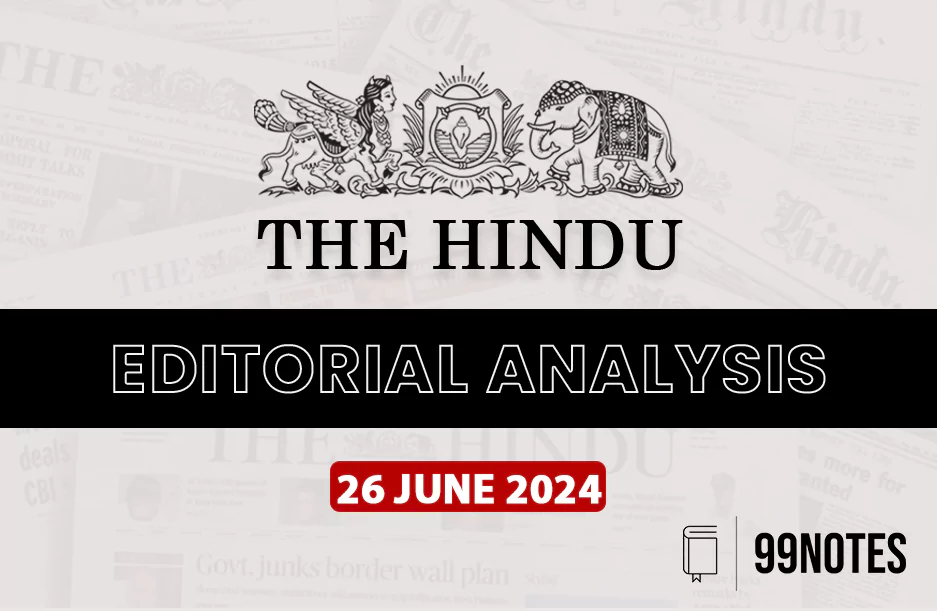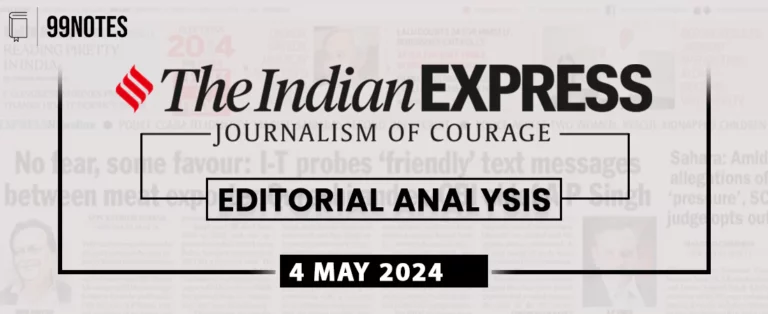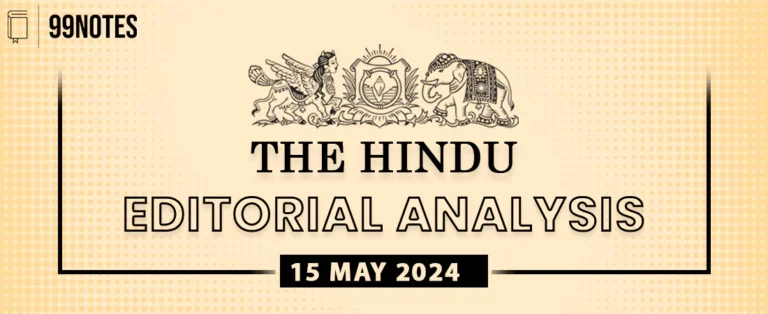26 June 2024 : The Hindu Editorial Analysis
1. India needs the anchor of a national security strategy
(Source – The Hindu, International Edition – Page No. – 8)
| Topic: GS2 – Governance |
| Context |
|
Introduction
- The new National Democratic Alliance government faces significant national security challenges, requiring crucial decisions on matters like building another aircraft carrier, implementing theaterisation, managing strategic relations with the United States, and competing with China.
- With competing demands on resources and attention, the government needs a holistic approach to national security.
Need for a Holistic Approach
- The government should step back and consider national security holistically, from first principles.
- Avoiding piecemeal and haphazard consideration of reforms and relationships is essential to prevent wasting resources and undermining national goals.
- A new rubric for decision-making is necessary, specifically, the formulation of a National Security Strategy (NSS).
Lack of a National Security Strategy
- Unlike many powerful states, India does not publish a National Security Strategy.
- As a result, capability investment decisions are often made through negotiations between military services.
- Plans and priorities become entrenched and are rarely re-evaluated systematically.
- Grand strategic vision is confined to a few individuals at the apex of government, often hidden behind closed doors or overshadowed by other political considerations.
Strategic Risks
- India must avoid a reactive stance in addressing strategic risks.
- Global challenges, from climate change to pandemics, require decades of coordinated policy effort.
- China presents an array of interconnected challenges, including a rapid naval build-up, geoeconomic influence in South Asia, and leverage in global supply chains.
- Conflicts in distant regions, such as Ukraine and Gaza, introduce new technologies and tactics that could spread to India’s neighbourhood.
- A regular process is needed to understand and plan for these challenges.
Benefits of a National Security Strategy
Comprehensive Strategic Assessment
- A National Security Strategy would necessitate a comprehensive strategic assessment, reviewing threats and opportunities and evaluating global security trends.
- This periodic review would force India to address evolving challenges, like the growth of the Chinese navy, before they become immediate and severe threats.
Coherent Framework for Long-Term Planning
- A National Security Strategy would provide a coherent framework for long-term planning.
- Strategic competition demands extensive work during peacetime to conceptualise security measures, develop military capabilities, and form international partnerships.
- A rigorous National Security Strategy would offer an overarching blueprint, helping the government make informed decisions on resource allocation, such as choosing between a new aircraft carrier for the Navy or raising a new infantry division for the Army.
- Without such a process, scarce resources might be wasted on projects with little strategic value, leaving the military scrambling to address capability gaps through emergency procurements.
Instrument for Signalling Intent
- A National Security Strategy would serve as an instrument for signalling to both friends and adversaries.
- It would clarify India’s strategic intent, such as its role as a net security provider in the Indian Ocean, and its commitment to countering armed coercion against smaller countries.
- It would also communicate India’s policies to its partners, highlighting areas of converging interests and explaining cooperation limits, helping to mitigate mismatched expectations.
Synchronisation of Government Efforts
- A National Security Strategy would create a mechanism to synchronise efforts across various arms of the government.
- Within the military, it would provide a top-down mandate to align the work of the Indian Army, Indian Air Force, and Indian Navy.
- Beyond the military, it would establish common goals and plans, improving coordination among national security agencies, including the Ministries of Defence, External Affairs, Home Affairs, and intelligence agencies.
- This would enhance daily coordination at the working level, rather than relying on episodic coordination at the Cabinet level.
Accountability and Transparency
- A National Security Strategy would introduce a new accountability tool, ensuring the bureaucracy adheres to the political leadership’s intent.
- It would make the government’s national security policies transparent to Parliament and the public.
- Indian citizens have a legitimate need to know how their government plans to safeguard national security and how effectively it is performing.
Characteristics of an Effective National Security Strategy
- Not all national security strategies are equally effective.
- A fully effective strategy should be a public document issued with the imprimatur of the Prime Minister.
- Its purpose is to synchronise efforts across the government and credibly signal the government’s political intent domestically and internationally.
- While it may not automatically resolve conflicts between different government arms, it should identify trade-offs and opportunity costs, enabling political leaders to make rational decisions for long-term growth.
- An effective National Security Strategy would provide the intellectual framework necessary for India to become one of the world’s leading powers.
Conclusion
- The new National Democratic Alliance government must address national security challenges with a holistic and strategic approach.
- Developing and implementing a National Security Strategy is essential to ensure coordinated, long-term planning and effective use of resources.
- By doing so, India can better manage its national security, address evolving threats, and strengthen its position as a global power.
| Practice Question: Discuss the importance of formulating a National Security Strategy for India in addressing contemporary security challenges and ensuring coordinated long-term planning. (150 Words /10 marks) |
2. Preventing another NEET fiasco
(Source – The Hindu, International Edition – Page No. – 4)
| Topic: GS2 – Governance |
| Context |
|
Introduction
- The National Eligibility Cum Entrance Test (NEET) this year saw inflated scores and ranks, causing many candidates to miss out on their desired colleges.
- Coaching and admission counselling centres, often run by business tycoons, faced backlash as their clients, NEET aspirants, did not secure preferred seats despite their advice.
- Despite this setback, the coaching industry leveraged media and social media coverage to enhance their brand value.
- Allegations of cheating and paper leakage have emerged, highlighting persistent issues in medical admission exams.
Vulnerabilities in NEET
- NEET is the largest exam in the ‘One Exam, One Nation’ model due to the number of candidates, languages, and diversity involved.
- Education quality and college fees vary significantly, with top government colleges costing a few lakhs and private colleges costing several crores.
- Parents often go beyond their means to secure high ranks for their children, as family reputation is at stake.
- High stakes make NEET vulnerable to both accidental and intentional irregularities.
Need for Strong Governance
- Strong governance with foolproof and complete Standard Operating Procedures (SOPs) is necessary to prevent weak links in the exam process.
- Weak links include incidents like distributing the wrong question paper at some centres.
- Both primary and secondary question papers were accessed almost simultaneously, raising questions about authorization and procedures.
- These errors led to further complications, such as panic among candidates and subsequent changes in grace marks.
Consequences of Errors
- A wrong question paper distribution led to the retrieval of Optical Mark Recognition (OMR) sheets, causing panic among candidates.
- Correct question papers were later distributed without additional time for the lost duration.
- Initially, huge grace marks were awarded for the lost time, which were later scrapped due to public outcry.
- These incidents underscore the need for critical SOPs involving all stakeholders in the exam process.
Role of the National Testing Agency
- Despite pitfalls, the National Testing Agency (NTA) disclosed most information voluntarily under Section 4 of the Right to Information Act, 2005.
- The NTA’s press releases since the declaration of NEET 2024 have included relevant information.
- SOPs for answer key disclosure, feedback collection on wrong questions and answers, individual OMR sheet disclosure, and self-evaluation of scores were followed without issues.
Historical Context and Legal Battle
- SOPs were developed through a decade-long legal battle in the Supreme Court and High Courts to ensure transparency in admissions to the Indian Institutes of Technology (IITs).
- In a 2011 judgement, the Supreme Court recognized efforts to challenge the Joint Entrance Examination (JEE) procedure and bring transparency, which helped make the merit ranking process more transparent and accurate.
Recommendations for NEET
- The NTA should develop SOPs to stabilise cut-offs, avoid inflated scores and ranks, and achieve a long-tail distribution.
- Ad-hocism should be replaced with well-defined, sound, and secure SOPs.
- A professional war-room culture should be adopted for quick and sound decision-making throughout the process.
- Continuous upgrading and fine-tuning of the selection process, as recommended by the Supreme Court, is necessary to keep the process relevant and meaningful.
Conclusion
- The new National Democratic Alliance government must address NEET’s vulnerabilities and establish strong governance through comprehensive SOPs.
- Ensuring transparency and consistency in the exam process will help maintain trust and fairness in medical admissions.
- A robust National Security Strategy, transparent procedures, and continuous improvement are essential for addressing the challenges and maintaining the integrity of national exams like NEET.
| Practice Question: Examine the challenges faced by the National Eligibility Cum Entrance Test (NEET) in maintaining transparency and fairness, and suggest measures to strengthen governance and prevent irregularities in the exam process. (250 Words /15 marks) |




